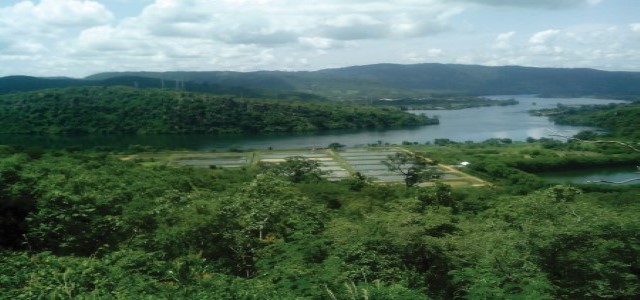The Volta River Basin covers semi-arid to sub-humid areas of six West African countries: Benin, Burkina Faso, Côted’Ivoire, Ghana, Mali, and Togo. The Basin is highly vulnerable to meteorological and hydrological events: for more than 20 years, some 2 million people – mainly the 68 percent of the population working in the agricultural sector – along the course of the Volta have been negatively affected by extreme floods. Basic socioeconomic problems in the region such as poverty and poor health have been aggravated by changes in climate over this period. And the climate is expected to keep changing. For Ghana, building resilience to the negative impacts of floods in its part of the Basin is becoming a priority at all levels of governance, from its transboundary neighbouring countries to local communities. GWP has been working with Ghana since the early 2000s to do this through exploring and promoting appropriate water investments, finding responses to the challenge of water-related disasters at each level of governance. Applying the Water Security and Climate Resilient Development Strategic Framework begins with understanding a shared problem and how it affects the institutions at each governance level. This means getting support from and cooperating with high-level national officials, facilitating dialogue across existing silos of thinking and planning, and, through partnerships, assembling interdisciplinary teams with diverse skill sets. GWP’s work with Ghana demonstrates the importance of attaching water and climate work to a common problem, then partnering with appropriate institutions to develop interventions that address the issue in context.
Transboundary cooperation
With floods a common challenge among the Member States of the Volta Basin Authority (VBA), GWP worked to include climate resilience in the Basin Water Charter. Findings of a vulnerability assessment carried out under WACDEP 2011–2015 were used to support this, leading to the Charter’s approval in May 2019 by the VBA Ministerial Council. Monitoring river conditions is essential to predicting and responding to floods. GWP’s partnership with the WMO to produce an assessment of flood management strategies and measures, as well as institutional, technical, and organisational needs in the Basin led to the award of an Adaptation Fund grant of €6.7 million. This grant was for a four-year project (2019–2023) to support the VBA and the six riparian countries to integrate flood and drought management and to develop early warning systems. The Country Water Partnerships of the VBA Member States are executing the project.
National adaptation planning
Transboundary work takes time and sometimes years of patient negotiation. During this time, GWP found a point of entry at national level by reviewing the status of and perspectives on the implementation of Ghana’s national adaptation planning processes, the Intended Nationally Determined Contributions, the water and climate-related SDGs, and the Paris Agreement. Because extreme flooding affects the river basin’s soils, biodiversity, and water quality that support people’s livelihoods, in 2017, WACDEP supported the National Development Planning Commission, Water Resources Commission, and CWP- Ghana to review the country’s water sector Strategic Environmental Assessment tools to incorporate climate change.
Finding shared interests across sectors
At sector level, the Ghana Country Water Partnership worked with the Water Resources Commission of Ghana to support the finalisation of investment priorities. This was done through stakeholder engagement with the White Volta Basin Investment Forum to develop an investment plan for the White Volta Basin Catchment Plan, while defining a coherent vision for the basin. In 2015 WACDEP supported the Water Resources Commission and the White Volta Basin Office by facilitating a multi-criteria analysis on investment impacts that could achieve resilience to water-related disasters, gender balance, and reduced vulnerabilities for the poor. Engaging the Water Resources Commission, responsible for regulation of water use and coordination of relevant government policies, was key in ensuring sustainability of the work.
Engaging local planners
At municipal level, working with the National Development Planning Commission, in 2016, GWP-WA and the GWP Country Water Partnership developed planning tools and training for local planners in Municipal District Assemblies for preparation of medium-term development plans. The work built capacity in prioritising investments to enhance water security and climate resilience at the district level.
Supporting district communities
At district, or internal river basin level, in 2016 GWP followed up WACDEP’s socio-economic and environmental analysis of selected communities in the Bawku, Binduri, and Bongo districts in Ghana’s Upper East region with demonstration projects focused on building community resilience among subsistence farmers, many of them women. Capacity building in strategies and technologies to deal with the impacts of flooding and drought was linked to integration of these investments in development planning and decision making processes in the districts of the White Volta Basin. A cross-section of government ministries, coordinated by the Water Resources Commission, were partners in the work.
Cascading the work of governance to ultimately create resilient communities is the aim of GWP’s water and climate work. Identifying a common challenge, and then working to transform the systems and institutions that can address it, has brought Ghana closer to taming its rivers’ destructive floods and making the best use of their waters into the future.
Photo: Portion of the course of the Volta Lake, Akasombo, Ghana. Credit: Bakudie via Wikimedia Commons.

